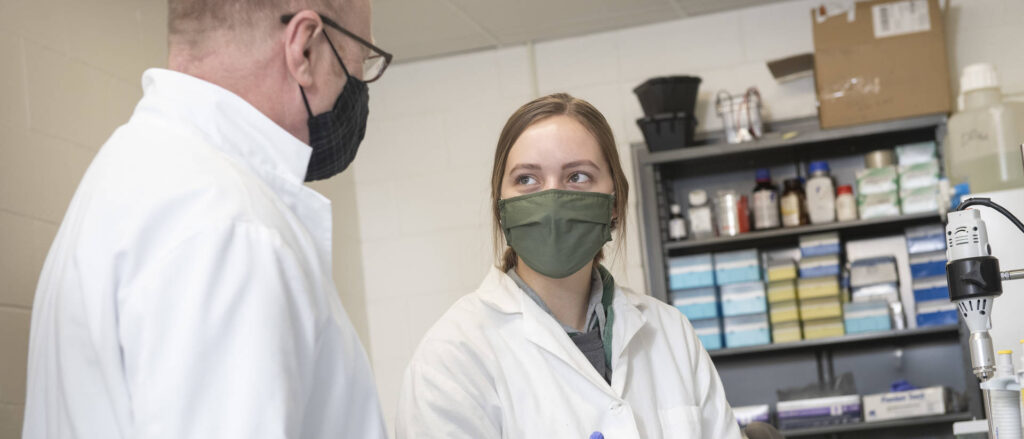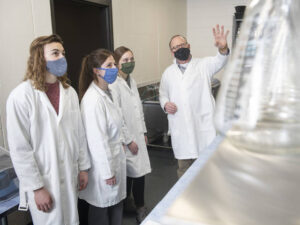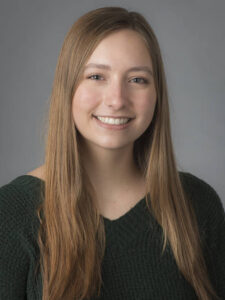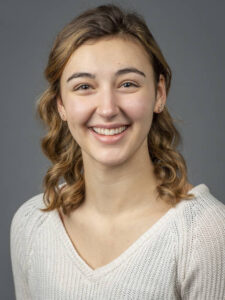
Dr. Doug Matthews and Quinn Petersilka, a freshman research assistant, are collaborating with Mayo Clinic on research about the effects of alcohol on aging brains.
While many senior citizens assume that having two or three drinks is harmless, a University of Wisconsin-Eau Claire research team has found that alcohol significantly affects older brains in ways that may threaten their health and well-being, including increasing their risk of falling.

Dr. Doug Matthews, professor of psychology
As people age, they feel the effects of alcohol differently than when they were younger, says Dr. Doug Matthews, a professor of psychology who has studied the effects of alcohol on the aging brain for several years.
“Something changes in the brain as we age,” Matthews says. “The older brain is fundamentally different, and the difference makes it more sensitive to alcohol. What is different, we do not know. That’s a wide-open question that we are actively pursuing.”
Matthews and his student research team were studying the effects of alcohol on adolescent brains when, out of curiosity, they included a group of aged animal brains in their work.
What they found was so significant that it changed the course of their research, Matthews says.
“The effects of alcohol on the aged brains were so large that we were stunned,” Matthews says. “From there, we began looking at the literature and found that we know very little about how alcohol interacts with the aging brain.”
Matthews says his research laboratory is one of a few labs he is aware of that are studying the effects of alcohol in aged rats, which will help them better understand why humans become more sensitive to the effects of alcohol as they age.
Partnering with Mayo Clinic experts
Thanks to a UW-Eau Claire-Mayo Clinic Health System research partnership agreement, Matthews and his undergraduate student research team are working closely with Dr. Doo-Sup Choi, a neuroscientist and professor at Mayo Clinic in Rochester, Minnesota, whose work focuses on neurobehavioral and addictive disorders.
Using cutting-edge technology, Choi investigates the impact of alcohol use on neurobiology and cognition.
“It’s been amazing,” Matthews says of the collaboration with Choi, which involves research on both the adolescent and aging brain. “The work we are doing is hopefully groundbreaking. We’re doing cutting-edge science and working with some of the best minds at Mayo Clinic. It’s the most exciting science I’ve been part of in my 25-year research career.”
The collaboration with Choi means that his research team can tap into Mayo Clinic’s expertise and its state-of-the-art technology, Matthews says.

A faculty-student research team has found the brain is more sensitive to alcohol in older people. The researchers include (from left) Dr. Doug Matthews and students Bailey Imhoff, Sam Scaletty and Quinn Petersilka.
It also allows his undergraduate student researchers to work with Choi, who is a world leader in his field, Matthews says, noting that he and his students participate in weekly virtual lab meetings with Choi.
His partnership with Matthews’ research team is meaningful, says Choi, who hopes to see even more Mayo Clinic scientists and physicians build connections with UW-Eau Claire faculty, staff and students.
“The new generation of scientists needs to solve more complex problems, especially in health-related challenges,” Choi says. “Science is moving fast, along with advanced technologies. Mayo is a leader in employing all the advanced knowledge and technologies to treat patients and discover new treatment methods.
“I believe undergraduate students who experience Mayo’s scientific or medical approaches will have better ideas to shape their future careers in medical science and medicine. This collaboration is not only for practical scientific achievement but also for training future scientists and health care professionals.”
By collaborating, the two labs are capitalizing on each of their strengths, allowing them to advance their research more quickly and in new ways, Choi says.
Advancing research into how alcohol effects the brain at different ages is critical because it is relevant to so many health-related issues, including those facing the elderly, Matthews says.
Their goal for their research relating to alcohol’s effect on aged brains is to identify the specific neurobiological mechanisms within the brain that change as people age, which increases their sensitivity to alcohol, Matthews.
“We are still in the infancy of understanding how alcohol impacts older people, but we know it affects things like balance and mobility,” Matthews says. “The work we are doing to understand how and why the brain changes as we age is really getting at a major health concern.”
Rapidly growing senior population
Understanding the effects of alcohol on the aging brain is especially important given the U.S.’s rapidly growing senior population, Matthews says. By 2060, it’s estimated that there will be 98 million people over the age of 65 in the U.S.
“It’s important that we understand the many health factors associated with this growing population, including the effects of alcohol, since we know older people are drinking and sometimes binge drinking,” Matthews says.
Studies show that in the U.S., 59.9% of men and 47.5% of women over the age of 60 currently consume alcohol, and older adults have the highest percentage of binge drinking of any age demographics, Matthews says.
It’s likely that those numbers are even higher because people in this population may not report their alcohol use to their health care providers, and they aren’t missing work or other engagements because of their drinking, Matthews says.
The effects of alcohol in older people have far-reaching implications for seniors themselves but also for the health care system, Matthews says.
“There is a potential silver tsunami coming,” Matthews says. “The population in the U.S. is aging and older people use health care more than other populations. So, even without the pandemic, our health systems will be stressed because of the increase in the size of the older population.”
Alcohol consumption can contribute to a host of health problems like heart disease and hypertension, but it also can contribute to problems with memory, cognitive decline and other issues that can impact seniors’ health, safety and quality of life, Matthews says.
For example, new federal data shows that Wisconsin has the nation’s highest rate of deadly falls among older adults. In the state, more people 65 and older die from falls than from breast and prostate cancer combined, the data shows.
“People often assume it’s because of our weather and the snow and ice,” Matthews says of the high number of deaths due to falls. “But other states with similar weather conditions have far fewer deaths. Alcohol consumption is high in Wisconsin and likely contributes to some of those falls. We know that when older individuals consume alcohol, their motor skills become much more impaired than when they were younger.”
Their research has shown that motor coordination, balance and movement in aged rats is significantly more impacted by alcohol when compared to adult or adolescent rats, Matthews says.
“The effect of alcohol on a person’s 70-year-old brain is different than on their 30-year-old brain,” Matthews says. “The two drinks a person has when they are 70 have a very different effect than two drinks did when they were 30 in terms of their balance and motor ability.”
Blugolds gain valuable skills
Matthews says one of the exciting parts of his research lab is that he is working with undergraduate students, some of whom are in their first year of college.
Most of his published articles have undergraduate co-authors, and most members of his research team have their names on one to three publications before they graduate, Matthews says.
“It’s really worked well for them,” Matthews says of the student researchers. “By the time they go off to graduate programs or to a job, they have a lot of experiences that students often don’t get until they are in grad school.”
Samantha Scaletty, a senior neuroscience major from Appleton, has co-authored two publications while working as a student researcher in Matthews’ lab during her four years as a Blugold.
Having those publications on her resume already is proving to be valuable, says Scaletty, who will graduate in May.
“I am interviewing for graduate school and having these publications puts me at a level above most other applicants, including those who come from much larger universities,” says Scaletty, who plans to earn a Ph.D., something she says she likely would not have considered had she not been part of Matthews’ research team.
Being immersed in research throughout her undergraduate years helped her feel more connected to the campus community, grow personally and become even more inquisitive, Scaletty says.
“I’m much more confident in my ability to think on my feet and rationalize situations on my own,” Scaletty says. “I not only know facts about neuroscience, but I can also ask inquisitive questions about the subject, which is an extremely important skill to have in this field. My research experience here has given me a strong foundation to build upon as I grow as a researcher.”
Making connections off campus
Choi, who interacts with UW-Eau Claire undergraduate researchers through national conferences as well as in-person and virtual meetings, says he is impressed by the Blugolds, who he describes as “well-educated and well trained.”
Last year, he offered a UW-Eau Claire student a summer undergraduate research fellowship position at Mayo Clinic, Choi says. That’s noteworthy because the fellowship program is highly competitive; typically, only about 10% of applicants are accepted each year, he says.
While the 2020 program was canceled because of COVID, Choi says he expects there will be more opportunities in the future for Blugolds to be part of these and other Mayo Clinic initiatives.
“I hope that more students are interested in pursuing their future academic and professional careers at Mayo Clinic,” Choi says.
This year, UW-Eau Claire and Mayo Clinic Health System launched the Blugold Biomedical Innovator Program, an initiative that aims to prepare the next generation of scientists and health care providers.
Students in the program have opportunities to collaborate with faculty on research and to network with Mayo Clinic scientists and medical providers from their first days on campus.
“These are high-achieving students who come directly into research labs,” says Matthews, who has three Innovator Scholars working with him in his lab this year. “It’s great because they have been working on this research with me from their first day here.
“These are experiences they wouldn’t be getting at a Big 10 or Ivy league school. They are first-year students working on research on campus, but they also are working with researchers at Mayo Clinic. It’s been tremendous for them and for us.”

Quinn Petersilka, Student Research Lab assistant.
Quinn Petersilka, an Innovator Scholar from Eau Claire who is a research assistant in Matthews’ lab, agrees, saying she values the opportunity the program has given her to gain knowledge and make connections on campus.
Having a mentor to turn to for advice and support has been helpful as she’s settled into college, says Petersilka, a communication sciences and disorders major who also is pursuing a certificate in American Sign Language.
“Getting this connection early on is super helpful,” says Petersilka, one of 10 students who make up the first Innovator Scholar cohort. “It also allowed me to get into a research lab right away. I worked in the lab for the entirety of first semester and over break, helping maintain the lab. I have learned how to run and analyze behavioral tests, harvest brain tissue and I’m currently helping run an experiment, which is something I never thought I’d be able to do my freshman year of college.
“It’s really exciting to know that I contributed to discovering something that we didn’t completely understand before and that it could branch off into different scientific studies in the future.”
Petersilka says the experience also is helping her appreciate how important it is to continue expanding our knowledge of the world through research.
“Being a part of a research project is a little stressful because the data that’s being collected is super important and there isn’t a large margin for error, but it’s very rewarding,” Petersilka says.

Bailey Imhoff works as a research assistant in Dr. Doug Matthews’ lab.
Bailey Imhoff, a freshman neuroscience major from Edgar who also works as a research assistant in Matthews’ lab, says UW-Eau Claire’s affiliation with Mayo Clinic Health System and its focus on undergraduate research are among the reasons she chose to attend the university.
Coming into college, her goal was to get involved with research as soon as possible, Imhoff says. It’s incredible, she says, that as a freshman she already is part of a research team that collaborates with Mayo Clinic scientists.
“The opportunities, experiences and education I am receiving in the lab will help me tremendously with advancing my knowledge and future career,” Imhoff says.
In the research lab, Imhoff does everything from providing animal care to running experiments to collecting data. She also is assisting Matthews in the lab’s ongoing research investigating a mutation on ethanol-induced spatial memory impairments.
These experiences are helping her see more clearly what her future might look like in the field of neuroscience, Imhoff says.
“I have learned a tremendous amount in a short amount of time, and I can’t wait for what is ahead,” Imhoff says. “I see all the steps it takes to run a successful lab, and the teamwork as well as communication that must be present.
“This experience has helped me be more certain that this is the path I want to take, although I am continuing to take it one step at a time. With experience comes emotion, knowledge and ‘aha’ moments, so I am taking the train in the right direction and seeing where it takes me.”
